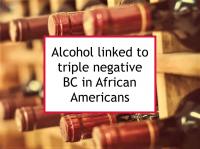Alcohol consumption is one of the most well-established risk factors for breast cancer. As few as one drink per week (including red wine) have been shown to increase risk. The increased risk conferred by drinking can begin as early as the teenage years. Furthermore, it increases in proportion with the amount of alcohol consumed.
There are genetically derived differences between African American women and those from other U.S. racial groups in terms of frequency, age at diagnosis, and type of breast cancer. Generally speaking, diet and lifestyle-related factors appear to affect risk similarly. However, there is some evidence that certain risk factors (such as being overweight or not breastfeeding children) influence breast cancer risk differently for women of different groups. While alcohol has been shown to increase breast cancer risk across ethnic groups in most studies, one 2016 study (see Adherence to diet, physical activity and body composition guidelines and breast cancer in the black women's health study below) reported that alcohol may be "less relevant in this population." Now a large new study has reported that African American women who consume at least seven drinks per week are at increased risk of triple negative (ER-/PR-/HER2-) breast cancer.
Latest research links alcohol to triple negative disease
The study referenced at the beginning of this news story was designed to investigate the association between number of alcoholic drinks consumed per week and risk of breast cancer among African American women. The study included 22,338 women in the African American Breast Cancer Epidemiology and Risk (AMBER) Consortium, including 5,108 women with invasive breast cancer. Approximately 35% of the cancer-free controls were current drinkers at the time of interview.
Women who reported current consumption of at least 14 drinks per week were found to have 1.33 times the risk of breast cancer as light drinkers (no more than three drinks per week). Women consuming at least seven drinks per week had elevated risks of ER- (1.31 x) , PR- (1.28 x), HER2- (1.36 x) and triple negative disease (1.39 x). Alcohol consumption was also associated with elevated risks of ER+/PR+ and HER2+ breast cancer, but less so than for receptor-negative cases. The patterns of association did not appear to be influenced by age of exposure (under 30 years, 30-49, over 50 years of age). Nor did birth control pill use, smoking, or menopausal status vary the risks associated with alcohol intake. The authors conclude that African American women who consumed seven or more drinks per week had an increased risk of breast cancer. Since alcohol intake is a modifiable risk factor for breast cancer, reduced intake among African American women should be encouraged, according to the authors.
Please see our articles on alcohol and how African Americans can improve their outcomes for more information.
